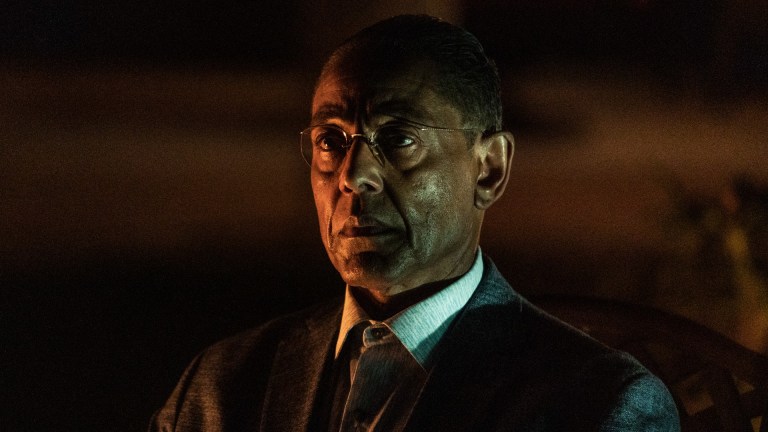Better Call Saul: Why Gus’s Sexuality Matters
The latest episode of Better Call Saul officially confirms what we've known about Gus all along. But here's why it still matters.

This article contains spoilers for Better Call Saul through season 6 episode 9.
Breaking Bad and Better Call Saul are well known for focusing on tightly-wound plots that usually exclude discussion on many of their characters’ personal lives. Most of the scenes we see relate back to their roles in the crime world, and if we see these in-between moments, they tie back to the main narrative.
This is why one particular scene was a real breath of fresh air on Better Call Saul season 6 episode 9 “Fun and Games.” Fresh off his victory over Lalo Salamanca (Tony Dalton) in the midseason premiere, Gus Fring (Giancarlo Esposito) decides to relax with a glass of wine at a fancy restaurant. We rarely see Gus away from his restaurant Los Pollos Hermanos or in the presence of non-cartel affiliated members. This makes him one of the most mysterious characters in television, and someone who we wish to know a lot more about.
At the bar, Gus comes into contact with a wine steward named David (Reed Diamond), and they seem to hit it off while discussing the nature of the alcoholic beverage Gus is enjoying. David really wants to spend more time with Gus, but the Chicken Man walks away from the potential kinship at the end of the scene.
While some may have just shrugged it off as Gus having a simple conversation with a stranger, the interaction could be queer-coding. This is especially likely because we know how passionate Gus is about avenging the death of his slain friend/partner/lover, Max. Ever since this famous scene of his backstory in Breaking Bad, fans have wondered what the nature of Gus’s sexual orientation is.
Surely no man would make it his life mission to kill an entire cartel family just to get revenge for the murder of a platonic buddy. But because people sometimes need everything spelled out for them, Gus’s homoerotic behaviors and motivations have remained a talking point.
This scene with Gus and David may be showrunner Peter Gould and company’s way of putting an end to the arguments and the Twitter talk and solidifying Gus’s status as a gay man. The five minutes between Gus and David are filled with flirtatious gazes and intimate nods to potential companionship. It was special to get to see Gus as a human being rather than just a psychotic meth manufacturer, and it painted the character in an entirely new light. Gus Fring is now even more entrenched as part of the LGBTQ+ storytelling legacy.
A specific subsection of the BB/BCS fandom didn’t necessarily love this confirmation, and it makes one wonder why it matters so much to the detractors? Is it because Gus sleeping with men makes him less masculine? Is he not a badass anymore because of this minor detail about him? Certain fans of these two shows have had a long, disappointing history of sexism and archaic viewpoints towards these ultimately progressive stories. It’s why Skyler White became the most hated female character of her generation, and actress Anna Gunn even received death threats for her portrayal of Walt’s spouse.
Breaking Bad is, in the eyes of its less sophisticated viewers, the story of a virtuous toxic masculinity power trip. That interpretation allowed insecure men who can’t read subtext to live vicariously through the many machismo-filled adventures of its protagonists and antagonists. This means that anything that gets in the way of the show’s daydream scenario for these folks is a threat to their sense of self-worth. Skyler got in the way of Walt’s mission, therefore she must be punished.
This represents femininity getting in the way of masculinity. Queerness has often been viewed in the same way. Gay men are stereotyped as prissy, weak, and not what a man should be. Gay men are too feminine, and this means they are not real men to bigots the world over.
Gus being gay gets in the way of what a lot of his fans want him to be. He is one of entertainment’s all-time great villains because he dominates a world filled with masculine immorality. Making drugs, selling drugs, murdering cartel members, and the like are typically very male-dominated activities, even in the real world. Gus’s juxtaposition between being a gay man and simultaneously the top dog in the criminal world doesn’t make sense to people who tie gayness to weakness.
What’s ironic is that Gus’s sexuality is what drives his entire character arc. His motivations in the drug game are all to honor Max. He hates everyone in this messy business because of what happened to his love. And he won’t get close to anybody else in an intimate manner because he thinks that would be forgetting about Max. This storyline runs parallel to the one with Jimmy, Kim, and Howard. Jimmy tells Kim that one day they’ll both wake up and forget what happened with Lalo shooting Hamlin in their residence. On the contrary, Gus doesn’t want to forget Hector taking out Max.
Gus is Gus because he won’t forget the people who have wronged him and his one true love. This type of subtle storytelling is one of the most brilliant discussions on sexuality in any famous TV drama. It’s not in-your-face, flavor-of-the-week like Vito’s plot line on The Sopranos. The themes that are layered into Gus’s character are inherently queer without even having to discuss them.
So, yes, it matters that Gus is gay. He wouldn’t be Gus Fring if he was straight. And it was very daring for the writers of this legendary show to give that final pseudo-confirmation in “Fun and Games.” The only people who will still be wondering about his sexuality are those who are in denial and can’t comprehend that queerness is so much more than who you sleep with. It’s part of your fabric. If you know, you know.
New episodes of Better Call Saul season 6 premiere Mondays at 9 p.m. ET on AMC.
